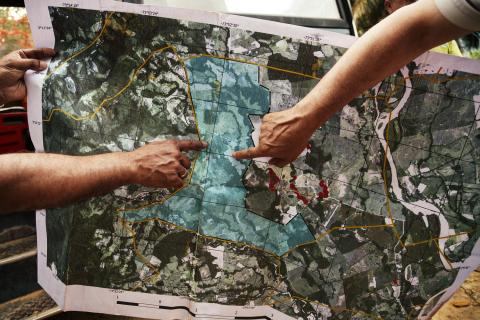Discover hidden stories and unheard voices on land governance issues from around the world. This is where the Land Portal community shares activities, experiences, challenges and successes.
 Follow our
Follow our
Sustainable Development Goals
Blog Series!
Interested in land corruption?
Follow our Land & Corruption Blog Series
for in-depth perspectives from the experts.
Issues
Geographical focus
Videos for English Speakers, with either English audio or subtitles
As part of a scoping study titled Land Governance for Climate Resilience: A review and case studies from LAND-at-scale projects headed by Richard Sliuzas, Emeritus Professor, University of Twente, Tropenbos Colombia dove into the links between climate and land governance in their project.
Context
The Articulation of the Indigenous Peoples of Brazil (Apib), together with its grassroots organisations, is present at the 27th UN Conference on Climate Change to reaffirm what needs to be done to tackle the global climate crisis: RECOGNIZE AND GUARANTEE LAND TENURE RIGHTS OF OUR INDIGENOUS LANDS!
The Land Portal published a new country portfolio for Argentina as part of our Country Insights initiative. The initiative seeks to expand knowledge about how countries govern their land, the challenges they face, and the innovative solutions they find to manage land tenure issues. Each portfolio comes with a detailed description of the land governance context and a collection of related blogs, news, publications, statistical datasets and more.
In conversation with Heidi Mendoza
The Filipino government can generate new momentum and resources for its longstanding community-based forest management programme, by placing it more centrally in its climate policies. This could benefit forest-dependent communities, but only if mistakes from the past are not repeated, argues Heidi Mendoza. It requires a better understanding of the conditions and constraints for community forestry.
Addressing the land and conservation communities’ discomfort in discussing the relationships between migrants, Indigenous peoples, and tropical forests in the fight against climate change.
Landscape restoration creates opportunities for securing the land and natural resource rights of local land users as well for improving soil health, sequestering carbon, and enhancing biodiversity.
Instruments like the Voluntary Guidelines on the Responsible Governance of Tenure of Land, Fisheries and Forests in the Context of National Food Security (VGGT) are "voluntary", i.e., legally non-binding. These instruments are intended to have a direct influence on the governance of the tenure practice of states by providing an internationally recognized set of principles, and by simultaneously encouraging good practices.
Using satellite technology and digital innovation, the United Nations Development Programme, through its Sustainable Palm Oil Initiative, in partnership with the Bogor Agricultural University (IPB), has built an Android-based digital system to address challenges in developing a land cover monitoring system.
The INA- Alert application allows users to get real time accurate information and it works in conjunction with the WebGIS Ecosystem, developed by Bogor Agricultural University (IPB) and the National Aeronautics and Space Agency (LAPAN).




